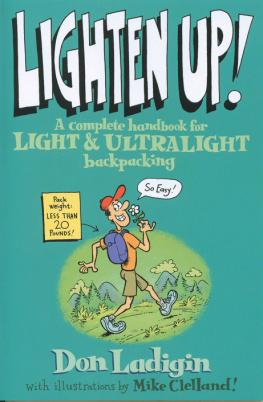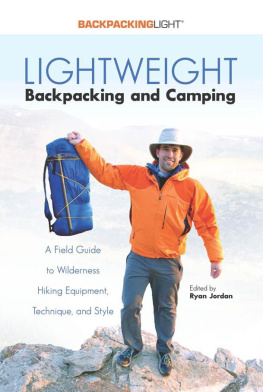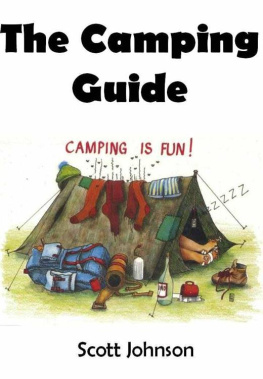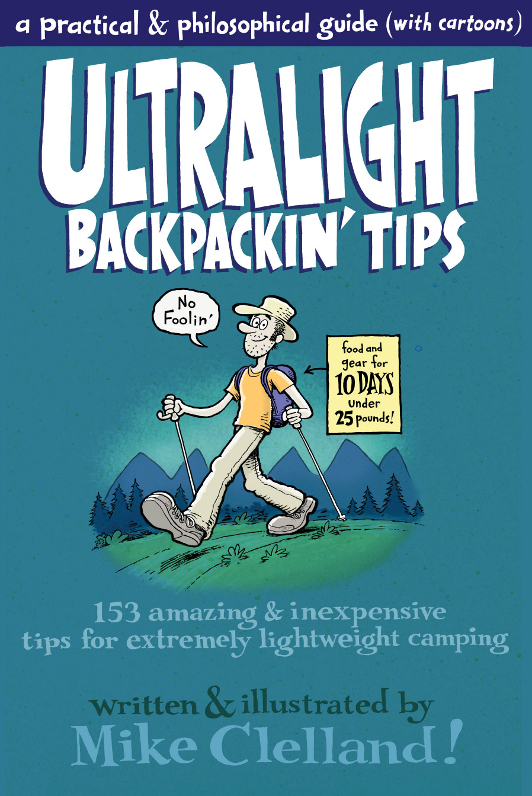
Copyright 2011 by Mike Clelland!
ALL RIGHTS RESERVED. No part of this book may be reproduced or transmitted in any form by any means, electronic or mechanical, including photocopying and recording, or by any information storage and retrieval system, except as may be expressly permitted in writing from the publisher. Requests for permission should be addressed to Globe Pequot Press, Attn: Rights and Permissions Department, P.O. Box 480, Guilford, CT 06437.
FalconGuides is an imprint of Globe Pequot Press.
Falcon, FalconGuides, and Outfit Your Mind are registered trademarks of Morris Book Publishing, LLC.
Illustrations: Mike Clelland!
Project editor: Julie Marsh
Layout: Joanna Beyer
Library of Congress Cataloging-in-Publication Data is available on file.
ISBN 978-0-7627-9604-5
The author and Globe Pequot Press assume no liability for accidents happening to, or injuries sustained by, readers who engage in the activities described in this book.
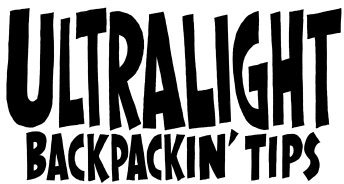

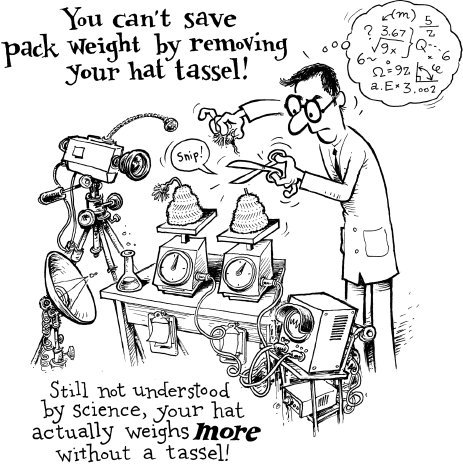
My thanks to Andrew Skurka, Sheila Baynes, Ryan Jordan, Scott Christy, Ryan Hutchins-Cabibi, Phil Schneider-Pants, Alexa Callison-Burch, Sunny Busby, Sam Haraldson, Allen OBannon, Jamie Hunt, Mike Martin, Don Ladigin, Glen Van Peski, and Natascha Jatzeck.
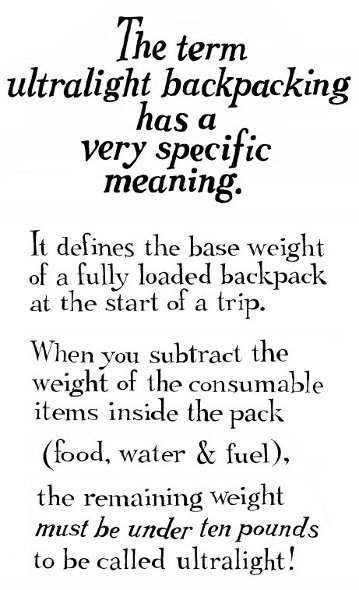
These first ten tips are a Manifesto, a proclamation of intent! Everything else in this book can be derived from these very simple ingredients.
The intended goal of this book is to provide some clever insights on how to travel efficiently in the mountains with a very light backpack. The hush-hush secret to ultralight backpacking is that its actually pretty easy, especially solving all the gear issues. The bigger challenge is embracing a new mind-set, and (hopefully) this book will balance these essential factors.
Focus on these initial ten points, and everything else will fall into place.
This is rule number one, and its absolutely essential. Do not proceed until this is solved. There is simply no way around it; weighing your gear is a prerequisite.
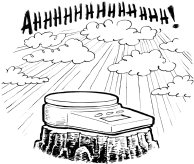
If you are an aspiring ultralight camper, this is the one and only tool that is truly required to get your pack weight to plummet. A simple digital postal scale has accuracy down to a tenth of an ounce, and knowing the weight of every single item is essential.
These are cheap and easy to find; a simple 5-pound digital postal scale from any office supply store is perfect. No need to pay more than 35 bucks, and there are good scales for as little as $19.95.
Anyone can go out into the mountains with a tiny amount of gear and sufferits easy to be cold, hungry, and ill prepared. You need to be warm at night, dry in the rain, well fed, and ready to deal with safety issues. Ultralight camping should be delightful, not stressful. The challenge is to succeed with only the gear thats absolutely needed (see ).
The first-aid kit is a good metaphor for your lightweight camping mind-set. You would be foolish to travel without one, right? But what is truly required? What can you effectively improvise? There is a blurry line between TOO heavy and TOO light. You can still go out into the backcountry with a very light pack and be comfortable and safe (see ).
This entire book could get boiled down to those two words. Do NOT simply put stuff in your pack. Look at every single item, weigh it, document it, hold it in your hand, ponder it, brood on it, and meditate over it. Only after this mindful deliberation should you decide if this item comes along. This cautious thought process happens for every single item! Do this every time you prep for an outing.
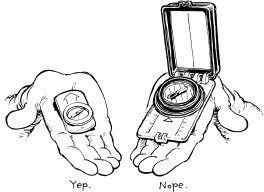
Questions to ask: Will I be fine without this? Is there a lighter option? Can this item serve more than one purpose; is it multiuse? Can I use something else and get the same results? A tent stake can hold your shelter down in the wind and also makes a pretty good trowel for digging a cat-hole, making it a true a multiuse option.
Be extremely meticulous with every decisionand every item. Weigh it, trim it down, and weigh it again. You either need it or you dont. If you dont need itit doesnt go in the pack.
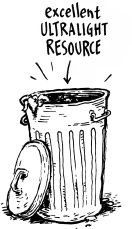
Its super fun to tinker with homemade designs and then put them to use in the backcountry. And quite often the lightest and simplest gear can be salvaged from the trash. The humble plastic water bottle is as light as it gets, and its essentially free (see ).
There is a myth that ultralight camping is an expensive undertaking, but it just aint true (see ). Sure there are a few items where its nice to purchase a high-quality piece of geartitanium cookware is wonderfully light, but it comes at a high price. Would an old beer can with the top cut off serve the same purpose?
I am living proof of this credo. I delight in the quirky problem solving required when wrestling with all the minutia of my pack weight. I encourage you to dig deep and fully accept your inner nerd. Its okay to obsess about half an ounce. I encourage that attitude! I enjoy using my finely crafted do-it-yourself gear in the mountains.

I fully recognize how dorky all this can be, and I acknowledge that I fit every stereotype of the weirdo zealot. But its fun, and fun counts for a lot. I take great pride wearing my homemade rain skirt in among a team of burly men!
Dont be content with achieving a homeostasis; you should unceasingly be evolving toward a goal of greater efficiency, comfort, and lighter weight. There will always be some new and interesting thing or technique you can test. Challenge yourself with every outing. If you try something and it doesnt work quite as well as you hopedso what! You learned something valuable by trying. Always try something new, ALWAYS!
The easiest way to get an items weight down to zero is simply NOT to put it in the pack. Yes, this means leaving stuff behind. This is harder than you think. There may be an item (or a bunch of them) that you have simply always carried with you, and it might be an ingrained routine to just toss that thing in your pack. Be very self-aware whenever this happens. Question your mind-set: Are you clinging to old habits?
Go through every item you might want to bring and truly ask yourself:
Next page





